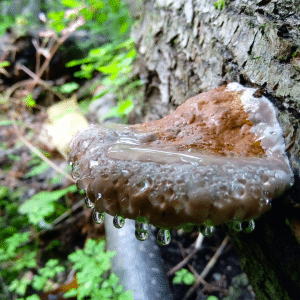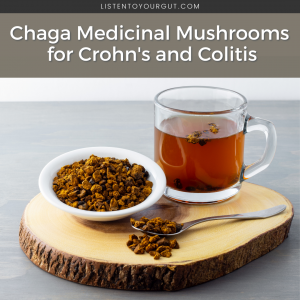How my Chaga journey began….
My interest in chaga really peaked when my doctor mentioned its benefits for ulcerative colitis during one of my office visits. He explained that new research has shown that chaga can help induce remission in patients with ulcerative colitis and help heal other IBD conditions!
I take it every day now and I am absolutely in love! Its benefits are immense, so it is definitely worth checking out whether you have Crohn’s disease, colitis, or any other form of IBD.
It tastes good too!
As I did more research, I noticed, among other things, that chaga has been shown to reduce inflammation in the gastrointestinal tract – and that’s just ONE of its many benefits. But first what is chaga?
What is chaga?
In Northern Europe, Siberia, Russia, Korea, Northern Canada, and Alaska, chaga (Inonotus obliquus) is mainly grown on the bark of birch trees. So chaga is a mushroom in case you are wondering!
What are some of the benefits of chaga?
- Very rich in antioxidants
- relieves inflammation
- Supports immunity
- Prevents and fights cancer
- Lowers blood sugar
- Lowers blood pressure
And according to today’s medical news, here are a few more benefits for you!
Chaga mushrooms are rich in a wide variety of vitamins, minerals, and nutrients, including:
- B complex vitamins
- Vitamin D
- potassium
- Rubidium
- Cesium
- amino acids
- fiber
- copper
- selenium
- zinc
- iron
- manganese
- magnesium
- calcium
No wonder they call this a superfood!
Chaga and IBD
As I did more research, I found the following information from the Integrative Health Institute very useful:
Inflammatory bowel disease (Crohn’s disease and ulcerative colitis)
Chaga mushroom extract may be beneficial in treating inflammatory bowel disease. Oxidative stress (free radical damage) to cells that line the gastrointestinal tract can contribute to the development of inflammatory bowel diseases such as Crohn’s disease and ulcerative colitis. Chaga mushroom extract suppresses edema (swelling) and damage to the mucous membranes in the intestine and has an anti-inflammatory effect on areas in the colon and rectum.
How can you consume chaga?
 Personally, I use a powdered form of chaga and a mushroom mix in my breakfast smoothie every day. But the cool thing about chaga is that there are three different ways to consume it!
Personally, I use a powdered form of chaga and a mushroom mix in my breakfast smoothie every day. But the cool thing about chaga is that there are three different ways to consume it!
You can consume it through:
- Tea – Chaga pieces can be boiled in water for 15-30 minutes to make a tea you can drink, and it can also be used as a base for soups or smoothies.
- You can also cook the chaga with other herbs or spices to create individual tea blends. It mixes well with chai spices (cardamom, ginger, cloves, anise, fennel, etc.) or with cocoa, chicory and dandelion root.
- Tincture / Supplement – Some dietary supplement companies have made really fantastic liquid chaga extracts and included chaga in their dietary supplement formulations.
- Powder – Chaga mushroom powder is easy to add to soups, smoothies, and teas. It has an earthy, slightly vanilla taste.
The LTYG Shoppe sells both Chaga powder and tincture. And if, like me, you are a big fan of mushroom medicine, we also have a medicinal mushroom tincture and a 10-mushroom formula in capsule form.
Mountain Rose Herbs supplies our Shoppe Chaga Powder, and you have a few important points to keep in mind when sourcing your Chaga:
“One of the things that make chaga so valuable is its indomitable. Like many other valuable mushroom varieties, Chaga only grows in the wild. Unbridled and untrained wildcrafting practices can threaten the future of chaga and its wild habitat. Inexperienced pickers often harvest whatever conks they find, regardless of size, and sometimes dig deep into the trees to extract as much of the fungus as possible. Such reckless harvesting practices will likely kill the fungus, its host tree, or both.
In addition to environmental hazards, improper harvesting practices can also severely affect the quality of the mushrooms they pass on to consumers. The timing of harvest is critical to getting the highest nutritional content in your chaga, but unregulated harvesters often collect chaga indiscriminately throughout the year. In addition, chaga can be dried without regulation or supervision and processed with impurities such as juice still intact, often under non-standardized temperature conditions that further increase the risk of mold and bacterial contamination.
Chaga contains the highest concentration of the antioxidant melanin during the coldest months of the year, so harvesting conks only maximizes their nutritious properties during mid-winter. Since chaga becomes more nutritious the longer it grows in a tree, only conks weighing six pounds or more are collected, while smaller ones are stored in a GPS device for future harvests. “
So … is chaga worth it?
In conclusion, I think chaga and other medicinal mushrooms are worth dealing with your gut or even other health issues! Because they are just fantastic for the immune system.
I hope this information can help you as it helped me on my healing journey. Let’s give it up for the ‘mushrooms!
Have you tried medicinal mushrooms while healing from IBD or other problems? Please comment below and let me know! 🙂

Linsy is Jini’s assistant. From a highly sensitive / reactive case of ulcerative colitis to complete freedom from medication and surgery using exclusively natural methods, Linsy understands the interplay of mind / body / soul on the healing path firsthand.


